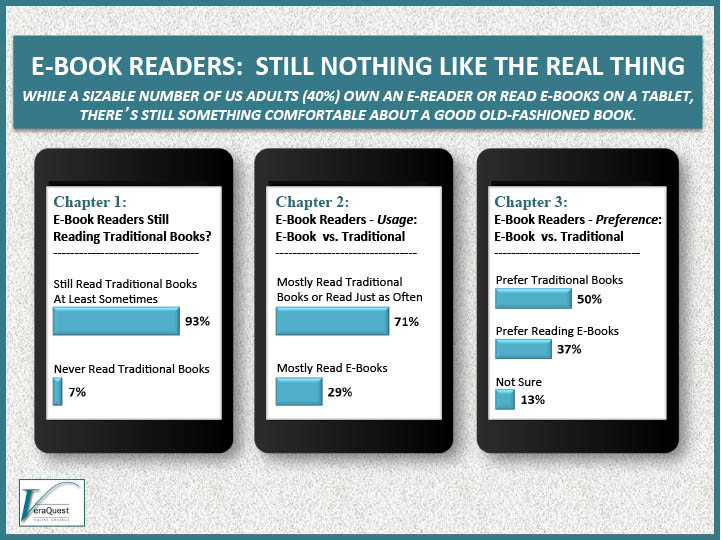I used to enjoy my Nook, though now I just read off my smartphone (sort of lost the Nook). Whether it’s the Nook app on my smartphone or an e-reader, I don’t really care; the bottom line is I really have no need for a hardcopy book. Seriously. Gone are the days where I have to put down a great read at bedtime because the night-table lamp is keeping my wife awake. And gone are the days where holding open the pages of a bigger book for more than five pages becomes annoying. Being able to read using an e-reader is awesome. It has everything I need: a dictionary, bookmark, highlighter and search function. What’s not to like? Well…apparently a lot.
We surveyed 1,500 U.S. adults on a recent VeraQuest survey so I could check-in to see if the rest of America was on-board with my love of the e-book. The results suggest that maybe my fellow Americans haven’t been drinking the e-book Kool-Aid.
A sizeable number of U.S. adults (40%) do own an e-reader or read e-books on a tablet. But I find it interesting that the vast majority within this group (93%) still read traditional books, at least sometimes. In fact, 71% either mostly read traditional books or read traditional books just as often as they read e-books. Only 29% of those who own an e-reader or read e-books on a tablet mostly read e-books.

I thought maybe it’s just an issue of e-book availability, and while they may have to read a traditional book sometimes, they’d actually prefer to read an e-book? Not so much. Overall, U.S. adults who read books prefer reading traditional books (69%) versus reading e-books using an e-reader/tablet (20%), with 11% saying they are not sure. It’s the same story, though not as much of a spread, when we look at results solely among those who own an e-reader or read e-books on a tablet – 50% prefer traditional books, 37% prefer reading e-books, and 13% are not sure.
The most often cited reasons for preferring traditional books are experiential in nature – reading a book is just more pleasurable (53%), I prefer the “feel” of a traditional book in my hands while reading (52%), and I’m just a more traditional person (46%).
The most often cited reasons for preferring e-books are more convenience-oriented – with an e-reader/tablet, you can have multiple books with you at a time (54%), you can download an e-book faster than you can buy a traditional book (51%), e-books are less expensive (46%), and an e-reader/tablet is lighter (easier/more convenient to carry) (44%).
Ok, so maybe Americans are a traditional or sentimental bunch, in general, when it comes to reading. But surely those young, non-traditional, tech-savvy Millennials prefer reading e-books, right? For starters, we see that more Millennials own e-readers or read e-books on tablets compared to their older counterparts (47% vs. 37%, respectively). But shockingly, Millennials who own e-readers or read e-books on tablets still prefer reading traditional books over e-books (52% vs. 34%, respectively, with 14% not sure).
I saw online that the first full-on modern e-reader – the Amazon Kindle – was launched about 8 years ago, in 2007. Perhaps that’s simply not enough time to pry sentimental American readers away from their hard- or soft-cover books. It will be interesting to see how reading evolves with Generation Z, as they will have had the e-book reading capability available for most of their lives once they reach adulthood. Until then…
Do you think that reading e-books will eventually overtake the reading of traditional books? If/when this happens, how will it make you feel?
Leave a Reply